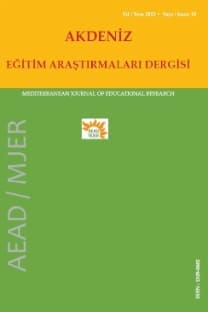Parental Views Regarding Homework
Formal education requires a planned education period to bring forth planned, controlled and required behaviors. Homework is one of the elements of plans in the educational process. In educational programs, homework is given to students as an out-of-class activity. There are some studies in the field of education, indicating the fact that homework does have an effect on students' achievement, while other research results state that homework has no influence on achievement and even causes unhappiness for students. In the education system of TRNC, homework is considered as a part of the educational process. Therefore, teachers assign homework to students in addition to in-class education. Parents, who play various roles in doing and checking homework, are another contributor to school education. Parents’ roles about homework might be influential on students’ success at school. Thus, it is very important to reveal parents’ perceptions about homework. Considering this important point, this study aims to reveal how parents of 4th grade students perceive homework using qualitative case study pattern. Research data were collected through a structured interview form designed by the researcher. Collected data were analyzed by “content analysis” technique encompassing mainly pattern identification, coding and classification processes. On the basis of findings obtained from collected data, suggestions were made concerning the things to do in terms of homework in the education system.
___
Açıkgöz, K. Ü. (2014). Aktif öğrenme (13. Baskı). İzmir: Biliş Yayıncılık.Akyüz, G. (2013). Öğrencilerin Okul Dışı Etkinliklere Ayırdıkları Süreler ve Matematik Başarısı Arasındaki İlişkinin İncelenmesi. Elektronik Sosyal Bilimler Dergisi. Yaz-2013 Cilt: 12 Sayı:46 (112-130).
Albayrak, M., Yıldız, A., Berber, K. ve Büyükkasap, E. (2004). İlköğretimde Ders Dışı Etkinlikler ve Bunlarla İlgili Öğrenci Davranışları Hakkında Velilerin Görüşleri. Kastamonu Eğitim Dergisi. Mart 2004 Cilt:12 No:1 (13-18).
Batman, K.A., Beidoğlu, M & Köklü, S. (2014). Öğrencilerin Ödev İle İlgili Algıları . VI. Uluslararası Eğitim Araştırmaları Kongresi, Hacettepe Üniversitesi, Ankara. 5-8 Haziran 2014.
Bempechat, J. (2004). The Motivational Benefits of Homework: A Social-Cognitive Persperctive. The Ohio State University Theory Into Practice, Volume 43, Number 3, Summer 2004.
Center for Public Education (2007). http://www.centerforpubliceducation.org/MainMenu/Instruction/What-research-says-about-the-value-of-homework-At-a-glance/What-researchsays-about-the-value-of-homework-Research-review.html. Erişim Tarihi 29-05-2014.
Cooper, H., Robinson J. C., and Patall E.A. (2006). Does Homework Improve Academic Achievement? A Synthesis of Research, 1987-2003. Review of Educational Research Spring 2006, Vol. 76, No. 1, pp.1-62
Creswell, J.W. (2009). Research design qualitative, quantitative, and mixed methods approaches (Third Edition). USA: SAGE Publications, Inc.
Demirel, Ö. (2008). Öğretme sanatı. öğretim ilke ve yöntemleri (13. Baskı). Ankara: Pegem A Akademi.
Eren, O. and Henderson, D.J. (2008). The impact of homework on student achievement. Econometrics Journal (2008), Volume 11, pp. 326-348.
Hill, C.E., Knox, S., Thompson, B.J., Williams, E.N., Hess, S.A., Ladany, N. (2005). Consensual qualitative research; an update. Marquette University; Education, College of Education Faculty Research And Publications.
Kapıkıran, Ş. Ve Kıran, H. (1999). Ev ödevinin öğrencinin akademik başarısına etkisi. PAÜ. Eğitim Fak. Derg. 1999, Sayı:5.
Karasar, N. (2005). Bilimsel araştırma yöntemleri (15. Basım). Ankara: Nobel Yayın Dağıtım.
KKTC Milli Eğitim ve Kültür Bakanlığı. (2005). Kıbrıs Türk Eğitim Sistemi. Lefkoşa: Devlet Basımevi.
Ilgar, Ş. (2005). Ev Ödevlerinin Öğrenci Eğitimi Açısından Önemi. Hasan Ali Yücel Eğitim Fakültesi Dergisi. Sayı 1. 119-134.
Marzano, R. J., Pickering D. J. (2007) 1 Special topic / the case for and against homework Responding to Changing Demographics Pages, 64(6), pp. 74-79.
http://www.ascd.org/publications/educational-leadership/mar07/vol64/num06/The-Case-For-and-AgainstHomework.aspx. Erişim Tarihi 29-05-2014.
Keogh, A.J. (1985). Teaching Strategies. A Guide to Better Instruction. D.C. Heath and Company, Toronto, Canada.
Orlich, D. C., Harder, R.J., Callahan, R.C., Kravas, C.H., Kauchak, D.P., Pendergass, R.A., Pattil, S.S. (2011). A study on parent participation in the home work of children. İndian Enrams Research Journal, 1(XI),pp.1-4.
Posner, G.J. (1995). Analyzing the curriculum (Second Edition). McCraw-Hill, Inc. New York.
Sönmez, V. (2005). Program geliştirmede öğretmen elkitabı (14. Baskı). Ankara: Anı Yayıncılık.
TC. Milli Eğitim Bakanlığı (2003). Eğitim ve Öğretim Çalışmalarının Plânlı Yürütülmesine İlişkin Yönerge http://mevzuat.meb.gov.tr/html/2551_0.html er. tarihi;29.05.2014.
Turanlı, A. S. (2009). Students’ and Parents’ Perceptions about Homework. Eğitim ve Bilim, Cilt 34 Sayı 153.
Türkoğlu, A., İflazoğlu, A. ve Karakuş, M. (2007). İlköğretimde ödev. İstanbul: Morpa KültürYayınları Ltd.Şti.
Yıldırım, A. Şimşek, H. (2008). Sosyal bilimlerde nitel araştırma yöntemleri (7. Baskı). Ankara: Seçkin Yayıncılık.
- ISSN: 1309-0682
- Yayın Aralığı: Yılda 4 Sayı
- Başlangıç: 2008
- Yayıncı: Tayfun Taşbilek
Sayıdaki Diğer Makaleler
FUNDA ERYILMAZ BALLI, MERVE MÜLDÜR, AYŞEGÜL BÜYÜKKARCI
Okul Öncesi Eğitimde Uygulanan Fen Etkinliklerinin Değerlendirilmesi
ZEYNEP BAŞKAN TAKAOĞLU, VİLDAN DEMİR
MESUT TABUK, Ahmet Aydın AYDOĞDU, Ayşegül KALYONCU, Deniz İlter ERTEN, Kübra ARSLAN, Nisa KARA, Tansu ARSLAN
Ümit GİRGİN, Aslı GEREK, H. Pelin KARASU
Norveç ve Türkiye Eğitim Sistemleri ile Öğretmen Yetiştirme Sistemlerinin Karşılaştırılması
Türkiye'de Çevre Kavramı Bağlamında Yapılan Metafor Çalışmalarının İçerik Analizleri
HATİCE ÇETİN, MURAT İBRAHİM YAZAR, SERHAT AYDIN, NURULLAH YAZICI
Önlisans Öğrencilerin Kodlama Eğitiminde Robotik Sistemlerinin Kullanımına Yönelik Görüşleri
